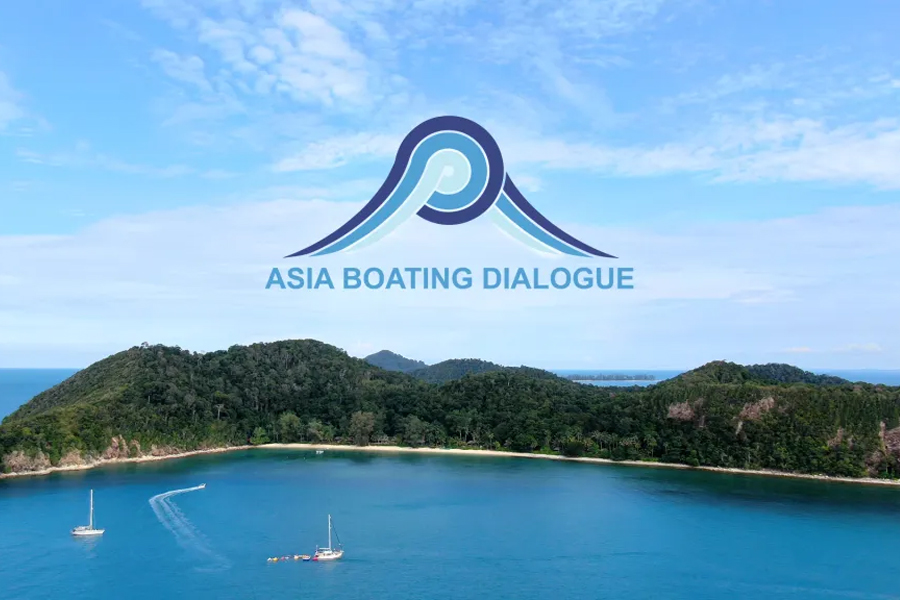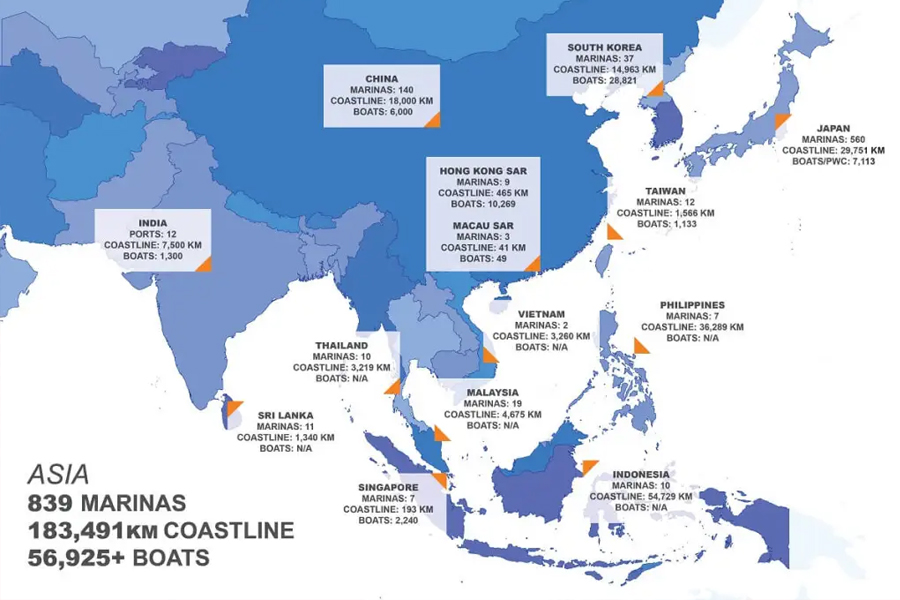
 alt="Lawrence Chow on Asia’s Brave New World"/>
alt="Lawrence Chow on Asia’s Brave New World"/>
Imagine a world in which we have a network of reciprocating marinas to provide the infrastructure for boaters to access all of Asia’s 183,491km of coastline. This network forms a cruising corridor from Japan all the way down to Indonesia, expanding cruising grounds and increasing interest in recreational boating across the region.
Productive dialogue between different countries in this network leads to better infrastructure planning and standardised government regulations. In this ideal world, regulations between borders in Asia are consistent and transparent, enabling people to travel between countries on their own boat or a charter yacht as easily as taking a flight before Covid-19 struck.
Already, the Aseanarean Bluewater Alliance in Southeast Asia and the Greater Bay Area in southern China are examples of regional networks that have the potential to connect and form a strong marina network in parts of the region. By extending this network, we can form a platform for dialogue and create the infrastructure for the industry to grow.
Perhaps this all seems quite hopeful, especially post-Covid. But this ideal world is what most yachting associations in Asia are aspiring to as we discovered in online discussions at this year’s Asia Boating Dialogue, comprising two 120-minute webinars and including 14 presentations from across the continent.
At the same time, developing yachting countries like India, Vietnam and China are among those seeking to standardise Customs, Immigration and Quarantine (CIQ) regulations, develop infrastructure and grow boating locally.

Speakers in Session Two of the two-part Asia Boating Dialogue
Developing markets in Asia often face challenges that stem from poor boat-registration regulations, complex CIQ procedures and lack of government support for the industry. In such countries, regulations for recreational boat registration are often the same as those for commercial vessels, making the process lengthy and difficult.
As such, many marina industry associations (MIAs) in Asia have been lobbying their governments for standardised recreational boating regulations by accepting certification from ship classification societies, ISO (International Organisation for Standardisation) and CE (Conformité Européenne) standards.
To support this effort, ICOMIA (International Council of Marine Industry Associations) has a Regulatory Reference Guide (RRG) that provides a central depository of regulations for MIAs to use when lobbying with their respective governments for standardised regulations.
For example, the Hong Kong Marine Department now widely recognises classification society regulations from the likes of RINA, DNV and Lloyd’s for vessels over 24m, and accepts EU Recreational Craft Directive – and therefore ISO standards – for vessels under 24m.
Discussions between the Hong Kong Boating Industry Association and the Hong Kong Marine Department since 2018 brought this into the local vessels’ Code of Practice in August 2020, helping to make registration of boats a straightforward process and raising boat safety standards to internationally recognised levels.
Apart from the challenges with registration regulations, another obstacle for the industry in Asia is the difficulty of travelling across borders because the CIQ procedures for visiting yachts vary significantly among different countries and ports.

Map showing the network of marinas in the Aseanarean Bluewater Alliance
As such, most MIAs are seeking to standardise CIQ procedures and make such information more transparent and accessible to yacht owners and captains. Once again, ICOMIA’s RRG plays an important role in being a valuable database that provides the latest regulations and procedures.
Developing markets in Asia can reference the regulations and convince their own governments to standardise CIQ procedures, making it much easier to cruise around Asia.
Standardised boat registration and streamlined CIQ regulations would make boating more accessible and provide the opportunities for boating to grow in the region. However, to truly facilitate this growth, a proper physical marina network needs to be in place.
Forming such an infrastructure network is particularly important for markets where cruising grounds are limited like Singapore, Shenzhen and Macau. This network has already taken shape in various pockets in Asia.
The Aseanarean Bluewater Alliance was formed to promote the nautical lifestyle and marine tourism in Southeast Asia, and support cruising yachts, by offering a network of marinas connecting the 10 ASEAN nations of Brunei, Cambodia, Indonesia, Laos, Malaysia, Myanmar, Philippines, Singapore, Thailand and Vietnam.
Currently, the network features 13 marinas in Singapore, Malaysia, Thailand and Indonesia, and has the potential to expand.
In other parts of Asia, there are many new regional hubs that have lots of potential such as the Greater Bay Area (GBA), comprising Guangdong, Hong Kong and Macau. Just as the GBA cities are now connected with a sophisticated ground transportation network, the coastal cities in the area could form a marina network.

Presentation of southern China’s Greater Bay Area covering Hong Kong, Macau and Guangdong province
The various MIAs could gather to share information on the CIQ procedures and compile a list of marinas for the visiting yachts. The government efforts to connect the cities and open the borders could lead to expanding the cruising grounds for Macau, Zhuhai and Shenzhen, which have limited options.
Hong Kong could become the nautical tourism capital of the GBA, as yachts from the neighbouring cities could visit the scenic islands on their personal yacht or charter a boat. Zhuhai could become the ship-repair hub of the GBA as the city has numerous world-class shipyards.
Macau could continue to become a major entertainment hub, where boats from surrounding cities could visit and dock for a week of fun. The development of the GBA provides the opportunity for the industry to grow and extend this network further.
Hainan can play an important role in connecting East Asia with Southeast Asia, due to its strategic location at the southern tip of China and its new status as a Free Trade Port. With government support, boats are exempt from all tax after registration in Yangpu Port and foreign vessels can visit for up to 90 days at a time and up to 183 days per year.
More details on the tax-free regulations and charters could be released by the Chinese government by late November and help underline why Hainan could become a particularly important node in the region’s marina network.
For this network to work on a grand scale, more moorings and marinas are needed in developed markets to accommodate visiting yachts. Hong Kong and Japan are suffering from a lack of berths, which affects industry growth and the potential to fulfil their roles as leaders of such a marina network in Asia.

Lawrence Chow, Asia Representative of the ICOMIA Executive Committee
If more moorings and facilities are created in these mature markets, the potential for growth would be tremendous. Asia has over 100,000 ultra-high-net-worth individuals (net worth upwards of US$30 million) and the number of wealthy individuals is set to grow faster in Asia than the rest of the world. Coupled with a developing infrastructure network, the boating industry in Asia has tremendous potential to grow.
To accelerate this growth, developing yachting markets should form MIAs to join international associations like ICOMIA and participate in platforms like the Asia Boating Dialogue to help set up the proper regulatory framework for recreational boating.
Through constant dialogue and learning from one another, there may come a day when we have a fully integrated network of marinas and boating associations in Asia that provides the framework for yachting in this beautiful part of the globe to realise its potential.
Chow is the Chairman of the Hong Kong Boating Industry Association and the Asia Representative of the ICOMIA Executive Committee. Raised in a family of marine industry professionals, he has a strong passion for sailing and currently oversees general operations for the China Pacific Marine dealership while also practising in the field of architecture. Chow and YP Loke were the main organisers of the 2020 Asia Boating Dialogue, co-organised by the Singapore and Hong Kong Boating Industry Associations in conjunction with ICOMIA.
